Acura TSX 2013 User Guide
Manufacturer: ACURA, Model Year: 2013, Model line: TSX, Model: Acura TSX 2013Pages: 325, PDF Size: 8.61 MB
Page 11 of 325
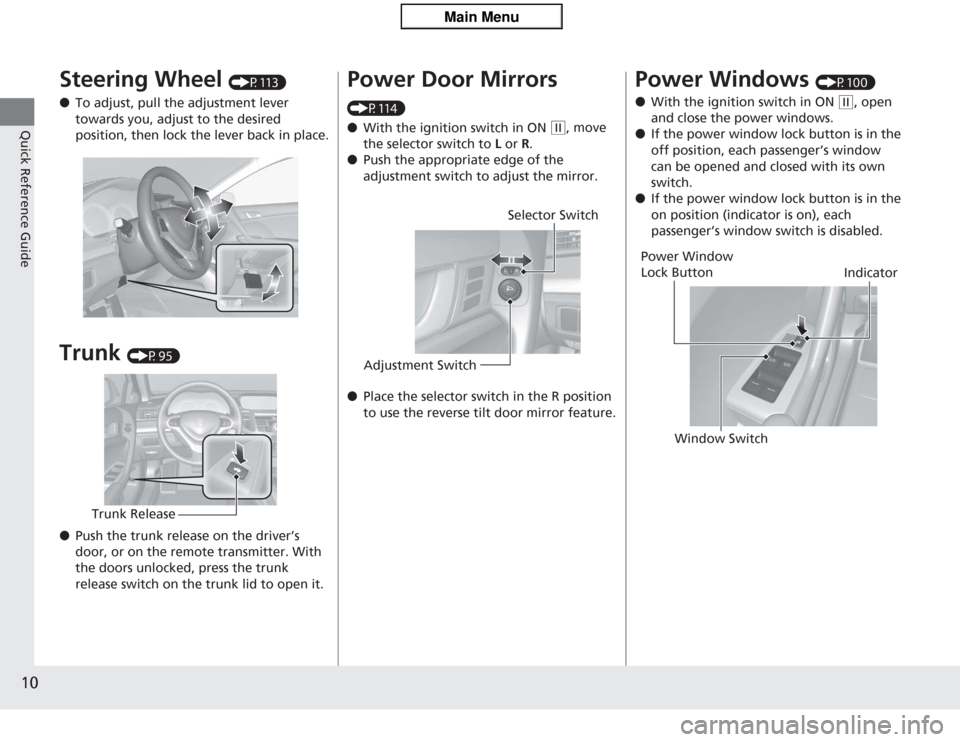
10Quick Reference Guide
Steering Wheel
(P113)
● To adjust, pull the adjustment lever
towards you, adjust to the desired
position, then lock the lever back in place.
Trunk
(P95)
● Push the trunk release on the driver’s
door, or on the remote transmitter. With
the doors unlocked, press the trunk
release switch on the trunk lid to open it.
Trunk Release
Power Door Mirrors (P114)
● With the ignition switch in ON
(w
, move
the selector switch to L or R .
● Push the appropriate edge of the
adjustment switch to adjust the mirror.
● Place the selector switch in the R position
to use the reverse tilt door mirror feature.
Selector Switch
Adjustment Switch
Power Windows
(P100)
● With the ignition switch in ON
(w
, open
and close the power windows.
● If the power window lock button is in the
off position, each passenger’s window
can be opened and closed with its own
switch.
● If the power window lock button is in the
on position (indicator is on), each
passenger’s window switch is disabled.
Power Window
Lock Button
Window Switch Indicator
Page 12 of 325
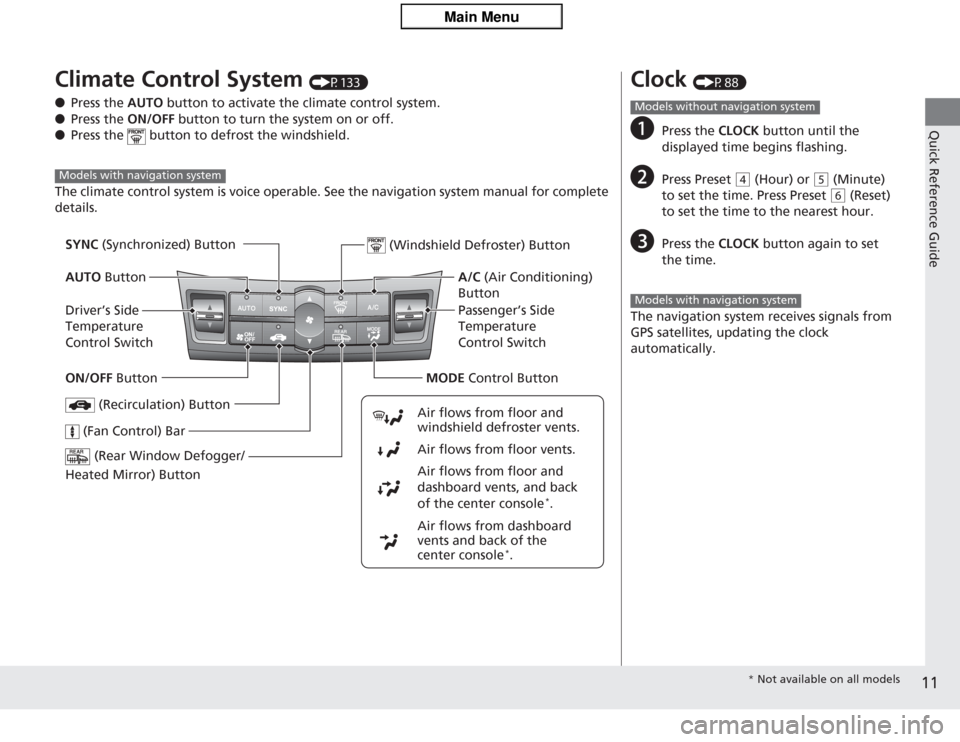
11Quick Reference Guide
Climate Control System
(P133)
● Press the AUTO button to activate the climate control system.
● Press the ON/OFF button to turn the system on or off.
● Press the button to defrost the windshield.
The climate control system is voice operable. See the navigation system manual for complete
details.
Models with navigation system
(Rear Window Defogger/
Heated Mirror) Button
(Windshield Defroster) Button
A/C (Air Conditioning)
Button
Air flows from dashboard
vents and back of the
center console
*.
Air flows from floor and
dashboard vents, and back
of the center console
*.
Air flows from floor vents. Air flows from floor and
windshield defroster vents.
(Recirculation) Button
(Fan Control) Bar
Passenger’s Side
Temperature
Control Switch
SYNC
(Synchronized) Button
AUTO Button
Driver’s Side
Temperature
Control Switch
ON/OFF Button MODE Control Button
Clock
(P88)
a
Press the CLOCK button until the
displayed time begins flashing.
b
Press Preset
( 4
(Hour) or
(5
(Minute)
to set the time. Press Preset ( 6
(Reset)
to set the time to the nearest hour.
c
Press the CLOCK button again to set
the time.
The navigation system receives signals from
GPS satellites, updating the clock
automatically.
Models without navigation systemModels with navigation system
* Not available on all models
Page 13 of 325
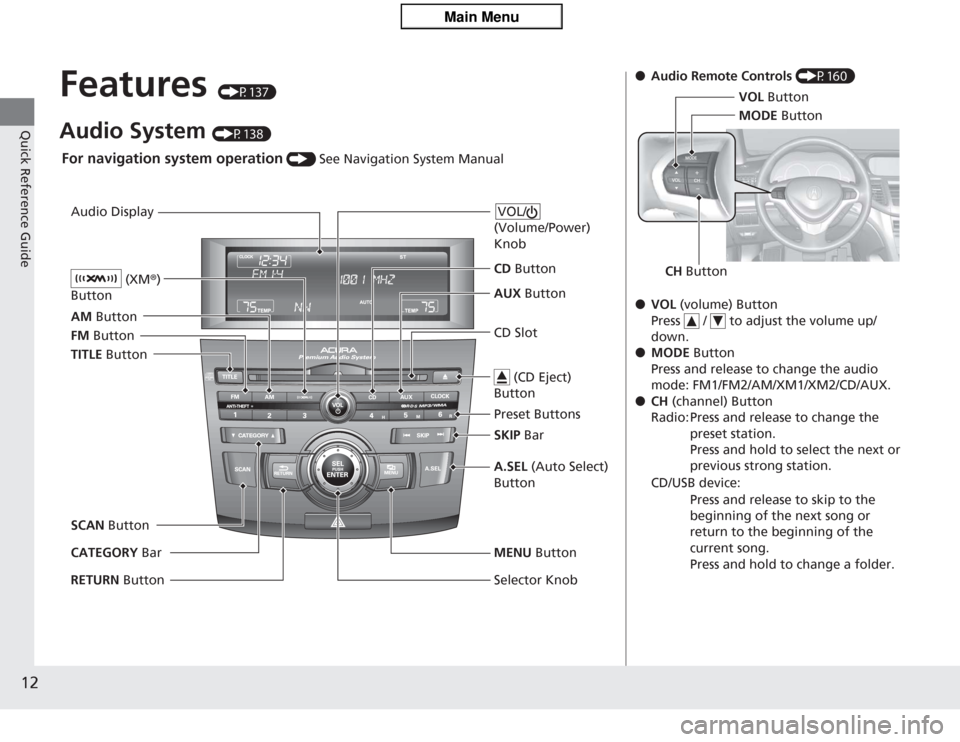
12Quick Reference Guide
Features
(P137)
Audio System
(P138)
Audio Display
AM Button
FM Button
SCAN Button
CATEGORY Bar A.SEL
(Auto Select)
Button
(Volume/Power)
Knob
VOL/CD Slot AUX Button
CD
Button
(CD Eject)
ButtonPreset Buttons
SKIP Bar
TITLE
Button (XM
®)
ButtonMENU Button
Selector Knob
RETURN Button
For navigation system operation
() See Navigation System Manual
●Audio Remote Controls (P160)
● VOL (volume) Button
Press / to adjust the volume up/
down.
● MODE Button
Press and release to change the audio
mode: FM1/FM2/AM/XM1/XM2/CD/AUX.
● CH (channel) Button
Radio: Press and release to change the preset station.
Press and hold to select the next or
previous strong station.
CD/USB device: Press and release to skip to the
beginning of the next song or
return to the beginning of the
current song.
Press and hold to change a folder.
VOL Button
CH Button MODE
Button
Page 14 of 325

13Quick Reference Guide
Driving
(P181)
Release ButtonShift Lever
Depress the brake pedal and press the
release button to move out of
( P
.
Move the shift lever without
pressing the release button.
Press the release button to move
the shift lever.
Manual Transmission
(P199)
Automatic Transmission
(P195)
● Shift to
(P
and depress the brake pedal when starting the
engine.
● Shifting
Park
Turn off or start the engine.
Transmission is locked.
Reverse
Neutral
Transmission is not locked.
Drive
Normal driving. D-paddle
shift mode can be used.
S Position
Sequential shift mode can be
used.
Paddle Shifters
(P197)
● Paddle shifters allow you to shift gears much like a manual
transmission (1st through 5th). This is useful for engine braking.
●D-paddle shift mode: The
transmission will shift back
to automatic mode once the
system detects that the
vehicle is cruising.
● Sequential shift mode: Holds
the selected gear, and the M
indicator comes on.
● The selected gear position is
shown in the instrument
panel.
Shift Down
(
-
Paddle Shifter Shift Up
(
+
Paddle Shifter Selected Gear
Number M
Indicator
Page 15 of 325
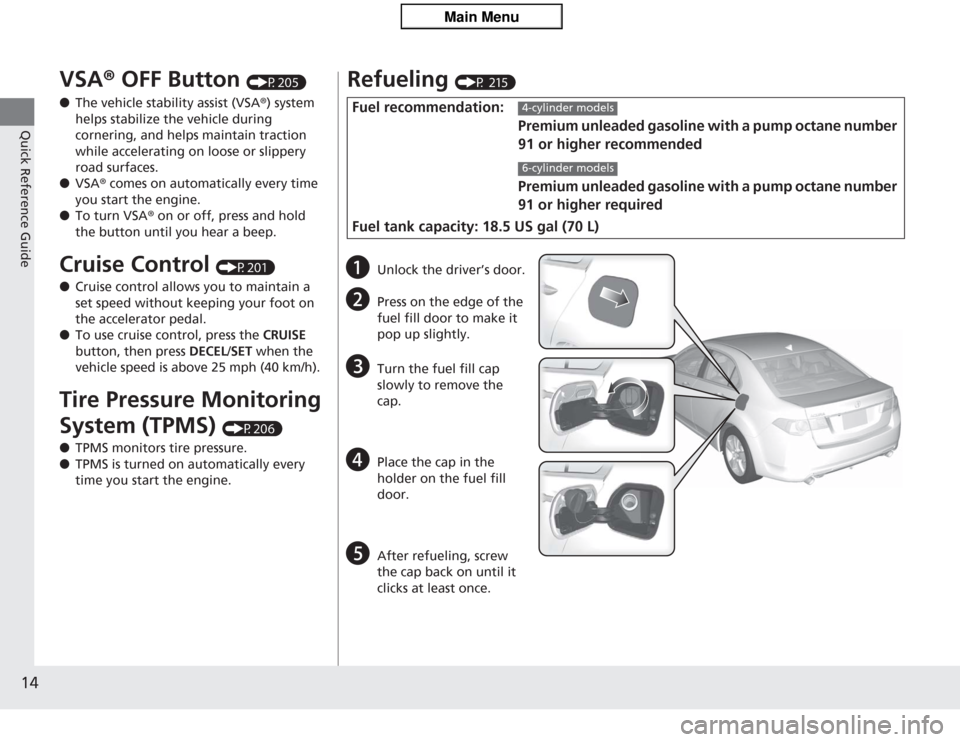
14Quick Reference Guide
VSA® OFF Button
(P205)
● The vehicle stability assist (VSA ®) system
helps stabilize the vehicle during
cornering, and helps maintain traction
while accelerating on loose or slippery
road surfaces.
● VSA ® comes on automatically every time
you start the engine.
● To turn VSA ® on or off, press and hold
the button until you hear a beep.
Cruise Control
(P201)
● Cruise control allows you to maintain a
set speed without keeping your foot on
the accelerator pedal.
● To use cruise control, press the CRUISE
button, then press DECEL/SET when the
vehicle speed is above 25 mph (40 km/h).
Tire Pressure Monitoring
System (TPMS)
(P206)
● TPMS monitors tire pressure.
● TPMS is turned on automatically every
time you start the engine.
Refueling
(P 215)
Fuel recommendation:
Premium unleaded gasoline with a pump octane number
91 or higher recommended
Premium unleaded gasoline with a pump octane number
91 or higher required
Fuel tank capacity: 18.5 US gal (70 L)
4-cylinder models6-cylinder models
a
Unlock the driver’s door.
b
Press on the edge of the
fuel fill door to make it
pop up slightly.
c
Turn the fuel fill cap
slowly to remove the
cap.
d
Place the cap in the
holder on the fuel fill
door.
e
After refueling, screw
the cap back on until it
clicks at least once.
Page 16 of 325
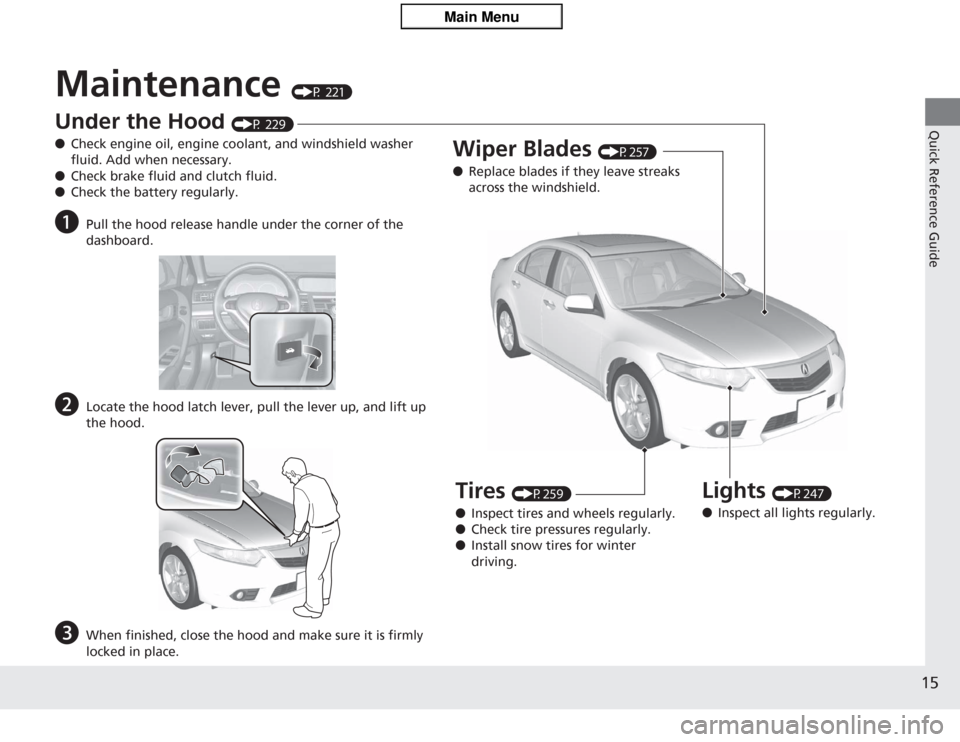
15Quick Reference Guide
Maintenance
(P 221)
Under the Hood
(P 229)
● Check engine oil, engine coolant, and windshield washer
fluid. Add when necessary.
● Check brake fluid and clutch fluid.
● Check the battery regularly.
a
Pull the hood release handle under the corner of the
dashboard.
b
Locate the hood latch lever, pull the lever up, and lift up
the hood.
c
When finished, close the hood and make sure it is firmly
locked in place.
Lights
(P247)
● Inspect all lights regularly.
Wiper Blades
(P257)
● Replace blades if they leave streaks
across the windshield.
Tires
(P259)
● Inspect tires and wheels regularly.
● Check tire pressures regularly.
● Install snow tires for winter
driving.
Page 17 of 325
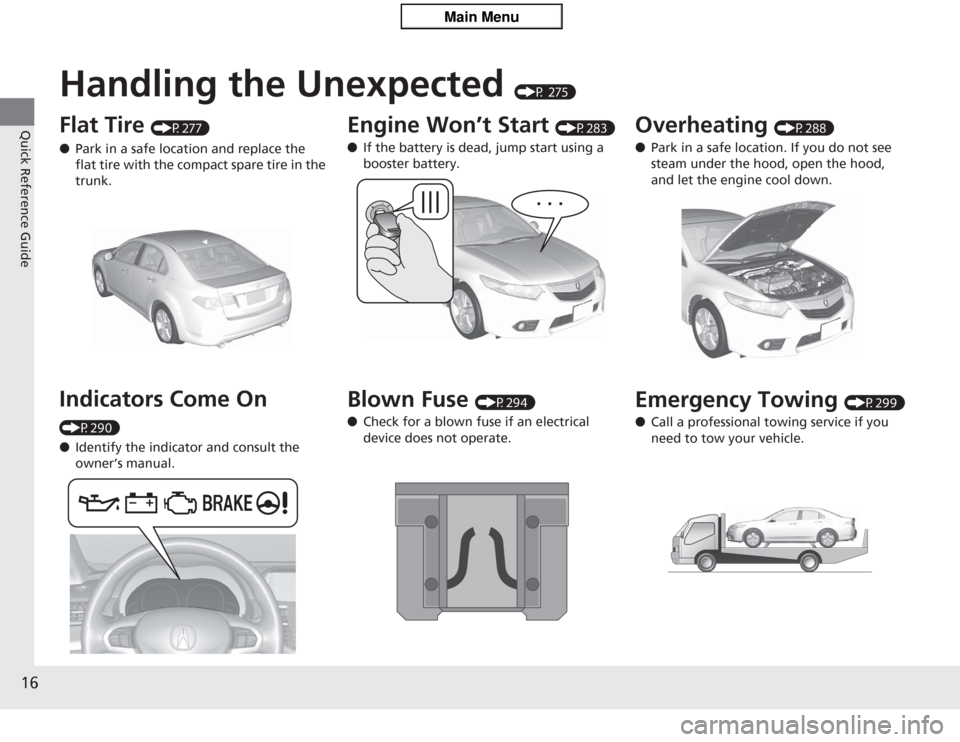
16Quick Reference Guide
Handling the Unexpected
(P 275)
Flat Tire
(P277)
● Park in a safe location and replace the
flat tire with the compact spare tire in the
trunk.
Indicators Come On (P290)
●Identify the indicator and consult the
owner’s manual.
Engine Won’t Start
(P283)
● If the battery is dead, jump start using a
booster battery.
Blown Fuse
(P294)
● Check for a blown fuse if an electrical
device does not operate.
Overheating
(P288)
● Park in a safe location. If you do not see
steam under the hood, open the hood,
and let the engine cool down.
Emergency Towing
(P299)
● Call a professional towing service if you
need to tow your vehicle.
Page 18 of 325
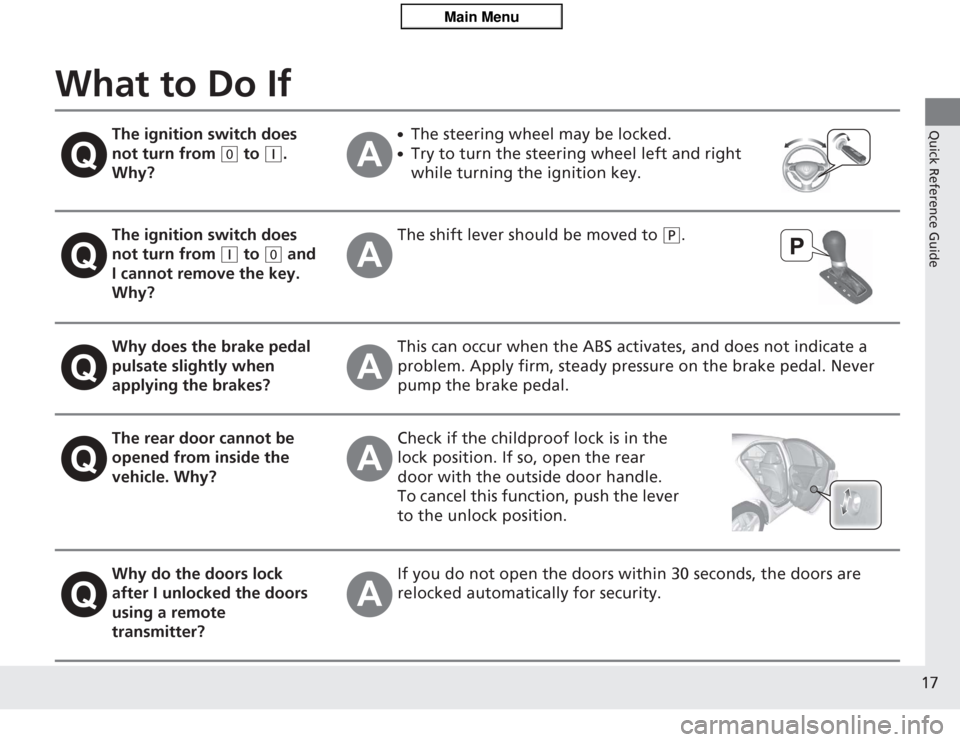
17Quick Reference Guide
What to Do If
The ignition switch does
not turn from
(0
to
(q
.
Why?
●
The steering wheel may be locked.
●
Try to turn the steering wheel left and right
while turning the ignition key.
The ignition switch does
not turn from
(q
to
(0
and
I cannot remove the key.
Why?
The shift lever should be moved to
(P
.
Why does the brake pedal
pulsate slightly when
applying the brakes?
This can occur when the ABS activates, and does not indicate a
problem. Apply firm, steady pressu re on the brake pedal. Never
pump the brake pedal.
The rear door cannot be
opened from inside the
vehicle. Why?
Check if the childproof lock is in the
lock position. If so, open the rear
door with the outside door handle.
To cancel this function, push the lever
to the unlock position.
Why do the doors lock
after I unlocked the doors
using a remote
transmitter?
If you do not open the doors within 30 seconds, the doors are
relocked automatically for security.
Page 19 of 325

18Quick Reference Guide
Why does the beeper
sound when I open the
driver’s door?
The beeper sounds when:●
The key is left in the ignition switch.
●
The exterior lights are left on.
Why does the beeper
sound when I start driving?
The beeper sounds when:●
Driver and/or front passenger are not wearing their seat belts.
●
The parking brake lever is not fully released.
Why do I hear a screeching
sound when I apply the
brake pedal?
The brake pads may need to be replaced. Have your vehicle
inspected by a dealer.
Is it possible to use
unleaded gasoline with a
Pump Octane Number
(PON) of 87 or higher on
this vehicle?
If premium unleaded gasoline with a PON of 91 or higher is not
available, you can temporarily use gasoline with a PON of 87 or
higher.
This will result in decreased engine performance, and can cause
occasional metallic knocking noise in the engine.
Unleaded gasoline with a PON of 91 or higher is recommended.
Unleaded gasoline with a PON of 91 or higher is required.
The long-term use of a lower PON gasoline can lead to engine
damage.4-cylinder models6-cylinder models
Page 20 of 325

19Quick Reference Guide
California Proposition 65 WarningEvent Data RecordersThis vehicle is equipped with an event data recorder (EDR).
The main purpose of an EDR is to record, in certain crash or near
crash-like situations, such as an air bag deployment or hitting a
road obstacle, data that will assist in understanding how a vehicle’s
systems performed. The EDR is designed to record data related
to vehicle dynamics and safety systems for a short period of
time, typically 30 seconds or less. The EDR in this vehicle is
designed to record such data as:
• How various systems in your vehicle were operating;
• Whether or not the driver and passenger safety belts were
buckled/fastened;
• How far (if at all) the driver was depressing the accelerator
and/or brake pedal; and,
• How fast the vehicle was traveling.
These data can help provide a better understanding of the
circumstances in which crashes and injuries occur. NOTE: EDR data
are recorded by your vehicle only if a non-trivial crash situation
occurs; no data are recorded by the EDR under normal driving
conditions and no personal data (e.g., name, gender, age, and
crash location) are recorded. However, other parties, such as law
enforcement, could combine the EDR data with the type of
personally identifying data routinely acquired during a crash
investigation.WARNING: This product contains or emits
chemicals known to the state of California to cause
cancer and birth defects or other reproductive
harm.
To read data recorded by an EDR, special equipment is required,
and access to the vehicle or the EDR is needed. In addition to the
vehicle manufacturer, other parties, such as law enforcement, that
have the special equipment, can read the information if they have
access to the vehicle or the EDR.
The data belongs to the vehicle owner and may not be accessed by
anyone else except as legally required or with the permission of the
vehicle owner.Service Diagnostic RecordersThis vehicle is equipped with service-related devices that record
information ab out powertrain performance. The data can be used
to verify emissions law requirements and/or help technicians
diagnose and solve service problems. It may also be combined with
data from other sources for research purposes, but it remains
confidential.California Perchlorate Contamination Prevention ActThe airbags, seat belt tensioners, and CR type batteries in this
vehicle may contain perchlorate materials - special handling may
apply. See www.dtsc.ca.gov/hazardouswaste/perchlorate/
As you read this manual, you will find information that is preceded
by a symbol. This information is intended to help you avoid
damage to your vehicle, other property, or the environment.
NOTICE